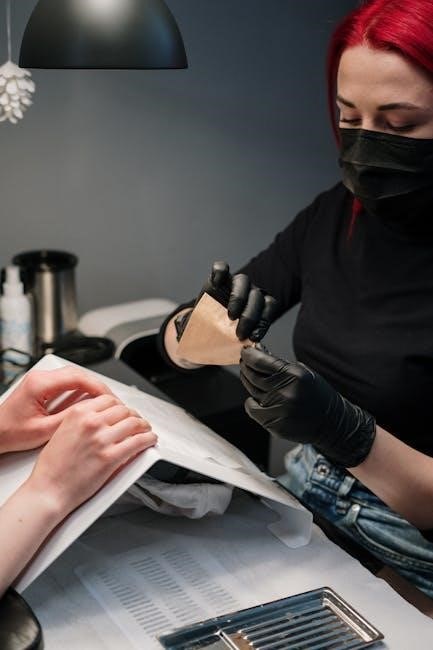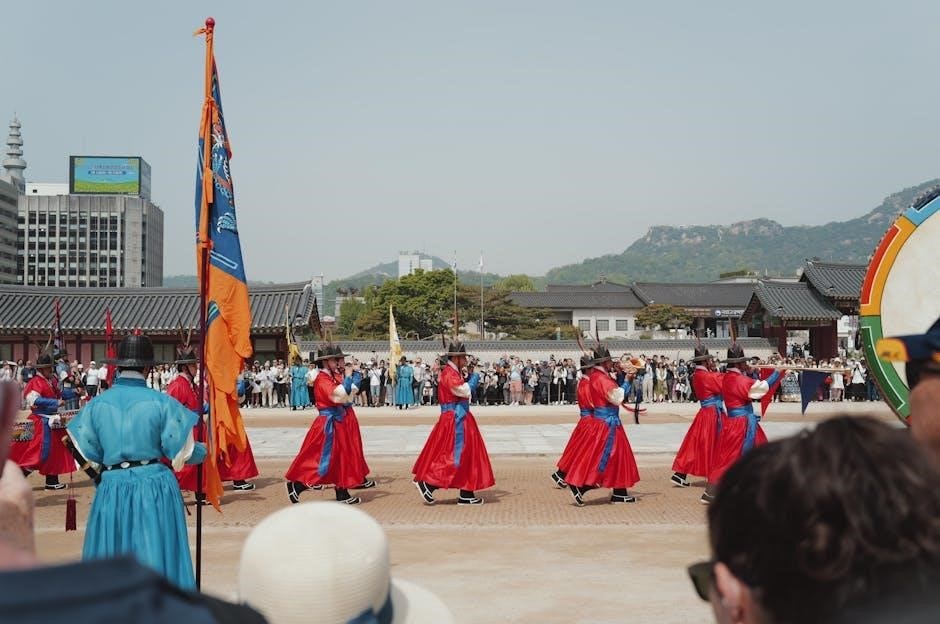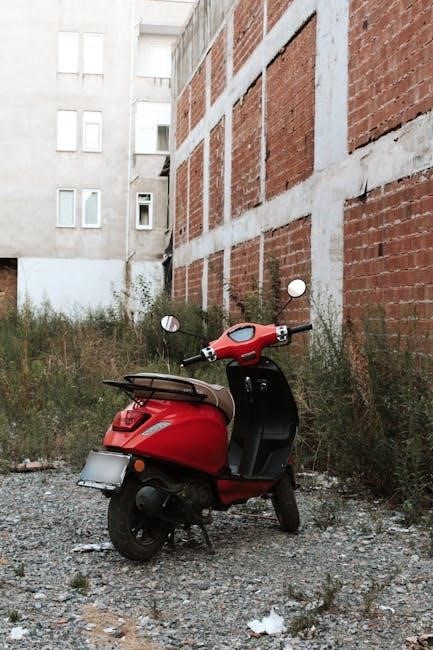eq blacksmithing guide
Blacksmithing in EverQuest is a central tradeskill for crafting weapons‚ armor‚ and tools. This guide provides a roadmap for mastering the craft from 1 to 300.
1.1 What is Blacksmithing in EverQuest?
Blacksmithing in EverQuest is a tradeskill that allows players to craft weapons‚ armor‚ and other metal items by forging raw materials. It involves using a smithy hammer and water flask to create essential gear for adventurers. This skill is crucial for crafting Steel Boning‚ which is used in tailoring‚ and supports other tradeskills. Blacksmithing is a cornerstone of EQ’s crafting system‚ enabling players to produce high-quality equipment for themselves and others.
1.2 Importance of Blacksmithing in EQ Tradeskills
Blacksmithing is a cornerstone of EverQuest’s tradeskill system‚ enabling players to craft essential weapons‚ armor‚ and tools. It supports other tradeskills like tailoring by producing Steel Boning. Crafting high-quality gear enhances gameplay and provides valuable resources for both personal use and trade. Mastery of blacksmithing is vital for progressing through the game‚ making it a highly sought-after skill for adventurers and crafters alike.

Getting Started with Blacksmithing
Begin your blacksmithing journey by training directly from a tradeskill master. This initial phase is simple and cost-effective‚ requiring a water flask and smithy hammer.
2.1 Training Your Blacksmithing Skill
Training your blacksmithing skill begins by seeking a tradeskill master. They will teach you the fundamentals‚ allowing you to start crafting simple items. Initial training is straightforward and cost-effective‚ requiring basic tools like a water flask and smithy hammer. This step is essential for building the foundation needed to progress further in the trade. Keep practicing to improve your proficiency.
2.2 Essential Tools and Materials
To begin blacksmithing‚ you’ll need a Water Flask and a Smithy Hammer‚ both of which are reusable and returned after crafting. Common materials include iron and steel‚ which can be purchased from vendors or mined. Rare materials like spiderling silks or leather padding may require drops from specific zones. Always ensure a steady supply of metals and components to avoid delays in your crafting progression.

Materials and Resources
Blacksmithing requires a variety of materials‚ from common metals like iron and steel to rare components like spiderling silks and LQ pelts‚ sourced from vendors or specific zones.
3.1 Common Blacksmithing Materials
Common materials include iron ore‚ steel ingots‚ and coal‚ which are readily available from vendors or mined in various zones. These basics are essential for crafting fundamental items and progressing early levels. Additionally‚ water flasks and smithy hammers are necessary tools for the crafting process. These resources form the foundation of your blacksmithing journey‚ enabling you to create basic weapons‚ tools‚ and armor.
3.2 Rare and Hard-to-Find Materials
Rare materials like spiderling silks and LDoN drops are crucial for high-end crafting. These items often drop in specific zones‚ such as East Karana for leather padding reagents. Shadowcream‚ found in later expansions‚ is essential for advanced recipes. Acquiring these materials can be challenging and time-consuming‚ making them highly sought after. They are vital for crafting premium gear and overcoming bottlenecks in your blacksmithing progression.
Leveling Your Blacksmithing Skill
Mastering blacksmithing requires patience and strategic progression. Start with basic materials‚ then gradually craft higher-tier items like Fine Plate Gear. Leather Padding is a key bottleneck‚ so plan accordingly and stay focused on efficient skill gains.
4.1 Early Levels (1-100)
Starting your blacksmithing journey‚ focus on crafting simple items like copper weapons and tools to build foundational skills. Train with a master blacksmith to unlock essential recipes. Begin with inexpensive materials such as copper and iron to minimize costs. As you progress‚ experiment with combining metals to create stronger alloys. Keep a steady supply of ores and coals to maintain consistent skill progression. This phase is crucial for developing efficiency and familiarity with the craft.
4.2 Advanced Levels (100-200)
At higher levels‚ focus on crafting Fine Plate armor‚ which requires leather padding and rare materials. This phase introduces more complex recipes and higher resource costs. Optimize your progress by crafting items in bulk and managing materials efficiently. The leather padding bottleneck can be challenging‚ but securing a steady supply ensures smoother advancement. This stage sets the foundation for transitioning to Banded Armor and more intricate crafts later in the game.
Crafting Fine Plate Gear
Crafting Fine Plate Gear involves transitioning from basic materials to more advanced resources. Focus on recipes requiring spiderling silks and LQ pelts‚ with some vendor-bought components. The Leather Padding bottleneck is critical‚ as it requires rare drops from East Karana. Stop progression at 188 unless pursuing Shadowscream armor post-Luclin expansion.
5.1 Recipes for Fine Plate Armor
Recipes for Fine Plate Armor require precise materials‚ including spiderling silks‚ low-quality pelts‚ and vendor-bought resources. These components are combined to craft pieces like bracers‚ gauntlets‚ and greaves. Progression focuses on skill levels 1 to 188‚ with Leather Padding being a critical bottleneck. This reagent‚ often dropping in East Karana‚ delays many crafters. Crafting Fine Plate Gear is essential for advancing blacksmithing skills before transitioning to higher-tier armor. Patience is key due to material scarcity and complexity.
5.2 Overcoming the Leather Padding Bottleneck
Leather Padding is a critical reagent for Fine Plate Armor‚ often delaying progress. It requires rare components like spiderling silks and low-quality pelts‚ commonly found in East Karana. Farming these materials can be time-consuming‚ but purchasing from other players or focusing on Banded Armor temporarily can alleviate bottlenecks. Group farming or prioritizing Leather Padding early ensures steady progression and avoids skill stagnation.
Transition to Banded Armor
Transitioning to Banded Armor begins once Fine Plate crafting becomes bottlenecked by rare materials. Banded Armor relies on vendor-purchased components‚ ensuring consistent progression without drop dependencies.
6.1 When to Start Crafting Banded Armor
Begin crafting Banded Armor once you’ve mastered Fine Plate up to around 188 skill. This transition is necessary due to the Leather Padding bottleneck in Fine Plate. Banded Armor relies on vendor-purchased materials‚ making it more accessible and cost-effective for steady progression without rare drop dependencies.
6.2 Differences Between Fine Plate and Banded Armor
Fine Plate requires rare materials like spiderling silks and LQ pelts‚ while Banded Armor uses vendor-bought supplies. Fine Plate is crafted up to 188 skill‚ then Banded becomes more efficient. Banded avoids Leather Padding bottlenecks‚ offering steady progression. Both provide similar stats‚ but Banded is more accessible and cost-effective for higher-level crafting.
Essential Recipes for Blacksmithing
Steel Boning is vital for tailoring‚ while Fine Plate and Banded Armor recipes are cornerstone crafts. These recipes form the backbone of a successful blacksmithing career.
7.1 Steel Boning for Tailoring
Steel Boning is a critical component for tailors‚ used in crafting high-quality armor and gear. Crafted by blacksmiths using iron and other metals‚ it requires precise techniques to ensure durability and flexibility. Tailors rely heavily on this item‚ making it a valuable craft for blacksmiths. The demand for Steel Boning is consistent‚ especially among players seeking advanced armor sets‚ making it a lucrative trade item. Properly crafting Steel Boning enhances both your blacksmithing and tailoring efforts‚ showcasing the synergy between these tradeskills.
7.2 Other Key Items to Craft
Beyond Steel Boning‚ blacksmiths craft essential items like Fine Plate Gear‚ Banded Armor‚ and rare tools. These items are crucial for progression‚ offering superior protection and utility. Crafting weapons‚ such as swords and axes‚ is also vital for both players and the in-game economy. Additionally‚ blacksmiths can create decorative items and rare components‚ like Sponge Iron‚ which are highly sought after. These crafts not only boost your skill but also support other tradeskills‚ making blacksmithing a cornerstone of EQ’s crafting system.

Tradeskill Mastery
Tradeskill mastery in EQ blacksmithing requires dedication and strategy. Focus on efficient progression‚ avoid common mistakes‚ and continuously refine your techniques to achieve expert-level crafting.
8.1 Tips for Efficient Progression
Start by training your blacksmithing skill from a tradeskill master to unlock basic recipes. Focus on crafting items with high trivial levels to maximize skill gains. Use vendor-bought materials initially to minimize costs. Prioritize creating items like steel boning for tailoring‚ as they offer consistent skill improvements. Avoid crafting low-demand items to save resources. Keep a balanced inventory of materials to maintain workflow efficiency and reduce downtime between crafts.
8.2 Avoiding Common Mistakes
Avoid neglecting the leather padding bottleneck in fine plate crafting‚ as it requires rare materials. Don’t overlook the importance of stockpiling vendor-bought supplies to prevent delays. Refrain from crafting low-demand items‚ as they waste resources. Avoid skipping skill-ups in brewing‚ as it reduces material costs. Don’t ignore the need for complementary tradeskills like tailoring to fully utilize crafted items. Plan ahead to avoid material shortages and inefficient progress.
Economic Considerations
Understand the cost of materials and time invested in crafting. High-quality items demand rare resources‚ increasing expenses. Selling crafted gear can yield significant profits‚ making blacksmithing economically rewarding.
9.1 Cost of Materials and Time
Crafting high-quality items in EverQuest blacksmithing requires significant investment in materials and time. Rare components like leather padding and spiderling silks can be costly and hard to obtain. The time spent farming or purchasing these resources adds to the overall expense; Additionally‚ failed craft attempts can further increase costs. Careful planning and resource management are essential to minimize financial losses and optimize efficiency in your blacksmithing journey.
9.2 Selling Your Crafted Items
Selling your crafted items in EverQuest can be a lucrative way to recoup costs and profit. High-demand items like Fine Plate gear and Banded Armor often fetch premium prices. Utilize the in-game Bazaar or direct player sales to maximize profits. Research market trends and set competitive prices to ensure your items sell quickly. Crafting rare or high-end items‚ such as Shadowscream Armor‚ can also yield significant returns‚ making blacksmithing a profitable tradeskill.

Role of Brewing in Blacksmithing
Brewing complements blacksmithing by enabling the creation of potions and items that reduce crafting costs and enhance efficiency‚ making it a valuable supporting skill for smiths.
10.1 Why Brew at 190?
Brewing at 190 is essential for creating potions that significantly reduce crafting costs and enhance efficiency. It allows blacksmiths to craft high-end items like Shadowscream armor without excessive expense. Achieving this skill level ensures access to rare recipes and resources‚ optimizing your blacksmithing progression and profitability in the game. This skill level is a cornerstone for advanced crafting‚ making it a critical step for serious smiths aiming for mastery.
10.2 Reducing Costs with Brewing
Brewing significantly reduces material costs by providing potions that enhance crafting efficiency. Potions like those for skill boosts or resource savings allow blacksmiths to craft high-end items with less expense. This skill complements blacksmithing by minimizing wasted materials and time‚ making advanced crafting more accessible and profitable. Brewing at higher levels ensures cost-effective progression‚ especially when crafting rare or complex gear.
Shadowcream and High-End Crafting
Shadowcream is essential for crafting high-end armor‚ particularly after the Luclin expansion. It enables the creation of advanced gear‚ making it a late-game requirement for blacksmiths.
11.1 When to Wait for Luclin
Blacksmiths should pause progression at skill 188 with Fine Plate armor and await the Luclin expansion. This allows access to Shadowscream‚ a rare material for high-end gear. Waiting avoids unnecessary costs and low-quality crafted items‚ ensuring efficient progression and superior equipment crafting once Luclin content becomes available.
11.1 Crafting Shadowscream Armor
Crafting Shadowscream armor becomes available after the Luclin expansion. It requires rare materials like shadowcream and velium. This armor is highly sought after for its superior stats. Ensure your blacksmithing skill is at least 300 to attempt these recipes. The process is complex‚ so stock up on supplies and consider brewing potions to reduce costs. Shadowscream armor offers unmatched protection‚ making it a must-craft for high-end gear.
Mastery of EQ blacksmithing requires patience and dedication. Continuous learning and adaptation are key to success. Keep refining your techniques to become a legendary blacksmith.
12.1 Final Tips for Success
Reach skill 188 for Fine Plate before progressing further. Manage materials wisely‚ especially Leather Padding‚ and brew potions to reduce costs. Stay updated with guides and learn from experienced players to refine techniques. Patience and dedication are key to mastering blacksmithing. Keep experimenting and adapting to optimize your crafting efficiency and achieve exceptional results in EverQuest.
12.2 Continuous Learning and Improvement
Mastering blacksmithing requires ongoing learning and adaptation. Experiment with new recipes‚ techniques‚ and materials to refine your skills. Stay updated with the latest guides and community insights. Practice consistently‚ analyze failures‚ and adjust strategies to optimize results. Embrace challenges and seek feedback to enhance your craftsmanship. Continuous improvement ensures long-term success in EverQuest’s blacksmithing world.











Leave a Comment